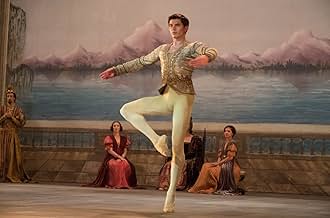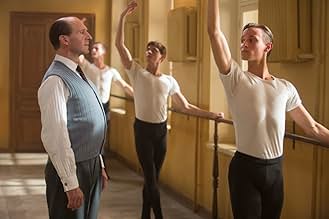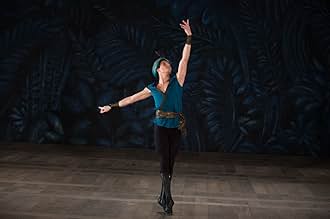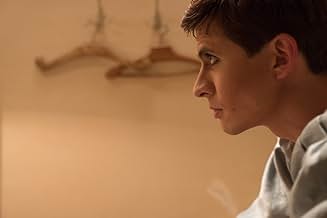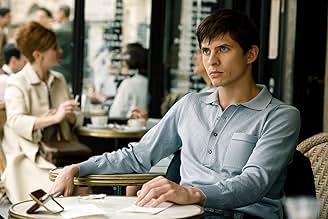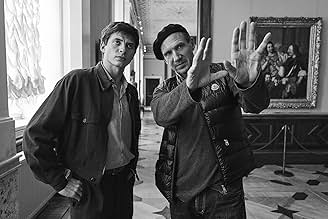IMDb-BEWERTUNG
6,6/10
7279
IHRE BEWERTUNG
Die Geschichte von Rudolf Nurejews Übertritt in den Westen.Die Geschichte von Rudolf Nurejews Übertritt in den Westen.Die Geschichte von Rudolf Nurejews Übertritt in den Westen.
- Regie
- Drehbuch
- Hauptbesetzung
- Auszeichnungen
- 1 Gewinn & 4 Nominierungen insgesamt
Empfohlene Bewertungen
My wife and I watched this at home on DVD from our public library.
While the focus of this movie is the 1961 defection of ballet dancer Nureyev you can't really tell that part of his life without understanding his beginnings, from being born on a train in 1938 to studying under the demanding Soviet system. Most of that takes up the first half of the movie.
I remember Nureyev well, he was such an inventive dancer and became popular world-wide in the 1960s and 1970s but I never knew his story. When the company of dancers would tour outside the USSR they were not supposed to exchange ideas or even talk to people from other countries but Nureyev never really followed the rules. When it looked like going back home might be bad for him, in France he defected, asking for political asylum. The scenes that retell and dramatize the incident are some of the best in this movie.
For the role Oleg Ivenko, a Ukranian who really is a ballet dancer in Russia and a first-time actor, plays Rudolf Nureyev and he plays him very well.
A really well made movie and a well told story, we enjoyed it.
While the focus of this movie is the 1961 defection of ballet dancer Nureyev you can't really tell that part of his life without understanding his beginnings, from being born on a train in 1938 to studying under the demanding Soviet system. Most of that takes up the first half of the movie.
I remember Nureyev well, he was such an inventive dancer and became popular world-wide in the 1960s and 1970s but I never knew his story. When the company of dancers would tour outside the USSR they were not supposed to exchange ideas or even talk to people from other countries but Nureyev never really followed the rules. When it looked like going back home might be bad for him, in France he defected, asking for political asylum. The scenes that retell and dramatize the incident are some of the best in this movie.
For the role Oleg Ivenko, a Ukranian who really is a ballet dancer in Russia and a first-time actor, plays Rudolf Nureyev and he plays him very well.
A really well made movie and a well told story, we enjoyed it.
The film's title derives from the Russian phrase "belaya vorona", or "white crow", meaning an outsider or nonconformist, a person who stands out from his or her contemporaries in the way that a white crow would stand out from its black fellows. The "white crow" of this film is the Russian ballet dancer Rudolf Nureyev, a man who had difficulty conforming to the official Soviet system, either in his artistic life or in his personal life. (He was gay at a time when this was neither lawful nor acceptable in Soviet society).
Nureyev shocked the world of ballet when he defected to the West at Le Bourget airport, Paris, in 1961, and the film is built around this incident. His decision to defect was, apparently, a spontaneous one, taken when the Communist authorities, irritated by the fact that he had spent much of his time in Paris in the company of Western intellectuals and concerned by rumours that he had been seen in a gay bar, decided to send him back to Russia rather than allowing him to travel with the Kirov ballet to London, the next leg of their tour. Scenes of Nureyev's stay in Paris are intercut with flashbacks to his poverty-stricken wartime childhood in the provincial city of Ufa and to his time as a ballet student in Leningrad, as St Petersburg was then known.
The film was directed by the well-known British actor Ralph Fiennes, clearly a ballet enthusiast. Fiennes also takes an acting role as Alexander Pushkin- not, of course, the classic Russian author but Nureyev's tutor at the Kirov Ballet. This was, I felt, one of two outstanding performances in the film. Pushkin emerges not only as a visionary who spotted Nureyev's talent when many did not but also as a sympathetic father-figure who provided the young dancer with a kindness and understanding that was otherwise lacking in the rigid, inflexible Soviet system. The other great performance, of course, comes from the young Oleg Ivenko as the conflicted Nureyev himself. On the one hand he is held by a love of his Russian homeland, the land which contains all he knows and all that he has held dear- his family, his friends and his mentor Pushkin. On the other hand, he is drawn towards the West, not only because of the greater intellectual freedom which it offers but also because of a feeling that it is only there that he can fully realise himself as a dancer.
I must admit that I am not a great balletomane myself; I have been to the ballet on only a handful of occasions in my life, and never saw Nureyev dance except on television. Yet there are some films which have been good enough able to hold my attention even though they are centred upon activities in which I would normally take little interest. Like most Britons, I know little about baseball, yet I was enthralled by "Eight Men Out" and "Field of Dreams". I probably know even less about wrestling, but that did not prevent me from admiring the more recent "Foxcatcher". "White Crow" comes into the same category. Those who love ballet will doubtless be enthralled by it. Even those of us who do not will be able to see enough in this movie to understand the enthusiasm of those who do. And both groups will join together in their appreciation of the human drama which lies at the heart of Rudolf Nureyev's story. 8/10
Nureyev shocked the world of ballet when he defected to the West at Le Bourget airport, Paris, in 1961, and the film is built around this incident. His decision to defect was, apparently, a spontaneous one, taken when the Communist authorities, irritated by the fact that he had spent much of his time in Paris in the company of Western intellectuals and concerned by rumours that he had been seen in a gay bar, decided to send him back to Russia rather than allowing him to travel with the Kirov ballet to London, the next leg of their tour. Scenes of Nureyev's stay in Paris are intercut with flashbacks to his poverty-stricken wartime childhood in the provincial city of Ufa and to his time as a ballet student in Leningrad, as St Petersburg was then known.
The film was directed by the well-known British actor Ralph Fiennes, clearly a ballet enthusiast. Fiennes also takes an acting role as Alexander Pushkin- not, of course, the classic Russian author but Nureyev's tutor at the Kirov Ballet. This was, I felt, one of two outstanding performances in the film. Pushkin emerges not only as a visionary who spotted Nureyev's talent when many did not but also as a sympathetic father-figure who provided the young dancer with a kindness and understanding that was otherwise lacking in the rigid, inflexible Soviet system. The other great performance, of course, comes from the young Oleg Ivenko as the conflicted Nureyev himself. On the one hand he is held by a love of his Russian homeland, the land which contains all he knows and all that he has held dear- his family, his friends and his mentor Pushkin. On the other hand, he is drawn towards the West, not only because of the greater intellectual freedom which it offers but also because of a feeling that it is only there that he can fully realise himself as a dancer.
I must admit that I am not a great balletomane myself; I have been to the ballet on only a handful of occasions in my life, and never saw Nureyev dance except on television. Yet there are some films which have been good enough able to hold my attention even though they are centred upon activities in which I would normally take little interest. Like most Britons, I know little about baseball, yet I was enthralled by "Eight Men Out" and "Field of Dreams". I probably know even less about wrestling, but that did not prevent me from admiring the more recent "Foxcatcher". "White Crow" comes into the same category. Those who love ballet will doubtless be enthralled by it. Even those of us who do not will be able to see enough in this movie to understand the enthusiasm of those who do. And both groups will join together in their appreciation of the human drama which lies at the heart of Rudolf Nureyev's story. 8/10
A beautiful film. But not so convincing. Correct but easy to reduce it to the last part tension. Interesting portrait of the period, expression of admiration for Nureev art, seductive ballet scenes and the hard try to convince. But, in too many parts, the film remains only a sketch. The good points - hard effort of Oleg Ivanko to create his role and to convince the viewer, the passion of Ralph Fiennes to the project, the presence of Sergei Polunin and the performance of Adele Exarchopoulos. The result is, obvious, a beautiful one . But convince it ? In few points, with indulgence in other.
This film tells the story of a Russian ballet dancer who defected in France during the cold war.
I can't quite believe how good this film is. The story is intense and captivating, even if you don't know about Rudi or about ballet. The dances portrayed are beautiful, the leading actors are great to look at too. The airport scene is so intense that I watched it several times. I also particularly like the fact that Clara Sant helped Rudi so much, without expecting anything in return. I enjoyed every bit of this film, and I strongly recommend it.
I can't quite believe how good this film is. The story is intense and captivating, even if you don't know about Rudi or about ballet. The dances portrayed are beautiful, the leading actors are great to look at too. The airport scene is so intense that I watched it several times. I also particularly like the fact that Clara Sant helped Rudi so much, without expecting anything in return. I enjoyed every bit of this film, and I strongly recommend it.
'The White Crow' tells of Soviet ballet star Rudolf Nureyev's defection to the West in Paris, 1961. And of his years training in Leningrad. And of his poverty-stricken childhood. Three strands running concurrently through the film make for a busy production. The childhood scenes do little more than establish that Nureyev grew up surrounded by poverty and lots of snow. The Leningrad scenes show him as willing to work for his craft, but intense, self-centred and very arrogant - a proper little diva, in fact. Six years later, in Paris, he is still arrogant - demanding, for example, that a French female companion talk to a Russian waiter on his behalf because he suspects the man of looking down on him. But the intensity has weakened, replaced by an interest in what is around him and a happy curiosity in new things. This, however, does not please his KGB minders.
The film is the third from Ralph Fiennes wearing his director's hat. He does a pretty good job: the childhood scenes are shot in bleak, washed-out colours - almost black-and-white - a clever decision which creates atmosphere; and the climactic defection scene in Le Bourget Airport is heavy with tension. There *are* directoral flaws - something as simple as, for example, giving leading man Oleg Ivenko a different haircut for each era would have prevented this viewer's occasional confusion as to whether I was watching 1960s' Paris Nureyev or the 1950s' Leningrad version! And did we need quite so many extreme close-ups of Ivenko's face? But overall, director Fiennes does a good job...
... which makes it a shame that actor Fiennes turns in one of the weakest performances of the film. His portrayal of Nureyev's teacher Pushkin may, for all I know, be true to the real man, but I found it dreadfully studied and mannered, producing a caricature rather than a character (I will, however, give Fiennes full marks for delivering most of his lines in Russian!) Ukrainian dancer Ivenko, in what according to IMDb is his first acting role, turns in a more naturalistic performance, albeit within the confines of the generously-proportioned ego he is portraying. My personal favourite, however, was Chulpan Khamatova in a nicely-judged portrayal of Pushkin's wife Xenia, whose initial motherly interest in Nureyev (prompted by her husband's concern the stroppy teenager is not eating enough) develops over the course of the film.
Seen in preview at the British Film Institute, and - containing good pacing, an interesting story and nicely-rendered period detail - well worth it.
The film is the third from Ralph Fiennes wearing his director's hat. He does a pretty good job: the childhood scenes are shot in bleak, washed-out colours - almost black-and-white - a clever decision which creates atmosphere; and the climactic defection scene in Le Bourget Airport is heavy with tension. There *are* directoral flaws - something as simple as, for example, giving leading man Oleg Ivenko a different haircut for each era would have prevented this viewer's occasional confusion as to whether I was watching 1960s' Paris Nureyev or the 1950s' Leningrad version! And did we need quite so many extreme close-ups of Ivenko's face? But overall, director Fiennes does a good job...
... which makes it a shame that actor Fiennes turns in one of the weakest performances of the film. His portrayal of Nureyev's teacher Pushkin may, for all I know, be true to the real man, but I found it dreadfully studied and mannered, producing a caricature rather than a character (I will, however, give Fiennes full marks for delivering most of his lines in Russian!) Ukrainian dancer Ivenko, in what according to IMDb is his first acting role, turns in a more naturalistic performance, albeit within the confines of the generously-proportioned ego he is portraying. My personal favourite, however, was Chulpan Khamatova in a nicely-judged portrayal of Pushkin's wife Xenia, whose initial motherly interest in Nureyev (prompted by her husband's concern the stroppy teenager is not eating enough) develops over the course of the film.
Seen in preview at the British Film Institute, and - containing good pacing, an interesting story and nicely-rendered period detail - well worth it.
Wusstest du schon
- WissenswertesHayden Christensen, who trained extensively in ballet as a child, was first choice to star; however a persistent ankle injury prevented him from being able to perform to the standards demanded by Ralph Fiennes.
- PatzerIn a scene showing a close up of Nureyev's foot performing a tendu, the shoe he is wearing is a white split sole ballet slipper, a shoe that did not exist in the 1960s. Split sole ballet technique shoes have only been on the dance scene since the mid 1990s.
- Zitate
Claire Motte: You are with the company? Did you dance tonight?
Rudolf Nureyev: If I had danced, you would remember.
- VerbindungenFeatured in Ralph Fiennes & Oleg Ivenko in Conversation (2019)
- SoundtracksLa Bayadère 3rd Shade Variation
Composed by Ludwig Minkus
Arranged by Matthias Gohl
Performed by Ilan Eshkeri and The London Metropolitan Orchestra
Top-Auswahl
Melde dich zum Bewerten an und greife auf die Watchlist für personalisierte Empfehlungen zu.
Details
- Erscheinungsdatum
- Herkunftsländer
- Offizielle Standorte
- Sprachen
- Auch bekannt als
- Nurejew: The White Crow
- Drehorte
- Produktionsfirmen
- Weitere beteiligte Unternehmen bei IMDbPro anzeigen
Box Office
- Bruttoertrag in den USA und Kanada
- 1.828.784 $
- Eröffnungswochenende in den USA und in Kanada
- 78.782 $
- 28. Apr. 2019
- Weltweiter Bruttoertrag
- 7.622.595 $
- Laufzeit
- 2 Std. 7 Min.(127 min)
- Farbe
- Seitenverhältnis
- 1.85 : 1
Zu dieser Seite beitragen
Bearbeitung vorschlagen oder fehlenden Inhalt hinzufügen






